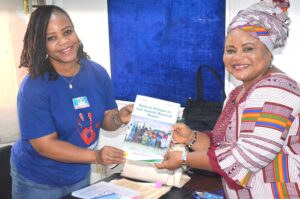ADVOCACY VISIT TO NATIONAL AGENCY FOR THE PROHIBITION OF TRAFFICKING IN PERSONS (NAPTIP)
Dalaba Street, Wuse Zone 5, Abuja
7th November, 2024
INTRODUCTION;
The Centre for Transparency Advocacy (CTA) conducted a courtesy visit to Ms. Binta L. Adamu Bello, Director General of the National Agency for the Prohibition of Trafficking in Persons (NAPTIP), and her legal team. This visit was in recognition of NAPTIP’s successful prosecution and conviction of Mr. Emmanuel Mudi Hamidu, a former Federal Road Safety Corps officer, who was found guilty of indecent assault and rape of an 11-year-old minor. Centre for Transparency Advocacy provided psychosocial support for the victim. CTA had a Lawyer and two staff that attended the court sessions from the beginning to the end of the prosecution earning commendations from the trial Judge. CTA’s involvement and support, represents its commitment to safeguarding vulnerable individuals.
OBJECTIVES;
The visit highlighted CTA’s gratitude and relief at Mr. Hamidu’s conviction and sentencing on July 8, 2024, less than two years after arraignment. CTA expressed pride in collaborating with NAPTIP to ensure successful prosecution for such offenses, especially given Mr. Hamidu’s position as a public officer.
CTA commended NAPTIP for achieving a timely prosecution of the case and assured the agency of continued collaboration. The visit served as a celebration of the conviction and an acknowledgment of the efforts and dedication of NAPTIP’s legal team.
REMARKS FROM NAPTIP;
Mrs. Ijeoma Mary Amugo, Director of Legal and Prosecution at NAPTIP who represented the Director General during the visit, expressed profound gratitude to CTA for its commitment to supporting the legal process and noted that this was the first time an NGO had returned to share appreciation after receiving a court judgment in which it lodged a complaint against the perpetrator. NAPTIP expressed a keen interest in an ongoing collaboration with CTA on cases involving rape and abuse but pointed out that the agency faces budgetary constraints, particularly lack of specific funding for addressing sexual and gender-based violence (SGBV).







